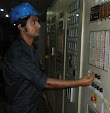PISTON RING CHECKING
Piston rings are to be diagnosed at regular intervals on the basis of the wear pattern. Piston rings have to be replaced after they have been use for time periods given in the maintenance schedule. Replacement will also be necessary if interim checking reveals damage to running surface or excessive clearances.
Different Piston Rings:
The rings being in use are compression rings with chromium-plated, Plasma-coated or (the most recent solution) chromium/ceramic-coated running surfaces, and chromium-plated oil scraper rings.
Different Piston Rings:
The rings being in use are compression rings with chromium-plated, Plasma-coated or (the most recent solution) chromium/ceramic-coated running surfaces, and chromium-plated oil scraper rings.
Piston
rings for MAN B&W 9L 58/64
|
||
Compressor Ring
|
Running Surface
|
|
Groove 1
|
Packing ring
|
Plasma-coated
|
Groove 2
|
Tapper ring
|
Chromium-coated
|
Groove 3
|
Tapper ring
|
chromium-coated
|
Oil scraper ring
|
||
Groove 4
|
Oil scraper ring
|
chromium-coated
|
Wear appearance of
plasma-coated, chrome-plated or chromium/ceramic-coated piston rings
Due to its shape, the running face of new compression rings
does not have contact across its full width but only the width of the actual
contact surface A. With the progress of wear, the actual contact surface width
will increase.
 Figure 1. Running face of plasma-coated and
chrome-plated piston rings (time in use > 1000 hrs)
Figure 1. Running face of plasma-coated and
chrome-plated piston rings (time in use > 1000 hrs)


Figure 2. System of cracks on chromium/ceramic-coated piston rings
(time in use approx. > 8000 hrs)
At the end of the useful life, the actual contact surface
extends up to the chamfers or radii of the ring sides, please see Figure 3.
Figure 3. Piston ring of good running pattern at the end of the useful
life.
The chamfers or radii are still distinctly visible on the
piston ring shown in Figure 3. Coated compression rings have to be replaced
when the actual contact surface extends over the entire piston ring width, i.e.
when the chamfers or radii are hardly visible any more. In this condition, the
residual thickness of the coating will not safely endure the subsequent
maintenance interval.
Burns (C) produce local discoloration of the piston ring
face. Such rings have to be replaced. (See Figure 4).
Figure 4. Piston ring with burns on the face
Coated compression rings and oil scraper rings have also to
be replaced if the coating has worn through at one spot.
Figure 5 shows a chrome-plated compression ring. Turn
chromium layer has completely worn spot wise at (D).
Broken-off particles or cracks in the coating of a piston
ring also call for its replace.
Figure 6. Piston ring with broken-off particles in the face
Figure 6 shows a plasma-coated compression ring. Parts of
the coating have broken off at (E).
Chromium/ceramic-coated compression rings have to be
replaced when the continuous, micro-cracked surface has decayed to a crazed crack
appearance. The cracks will then have extended down to the base material, which
involves the danger of particles breaking away.











No comments